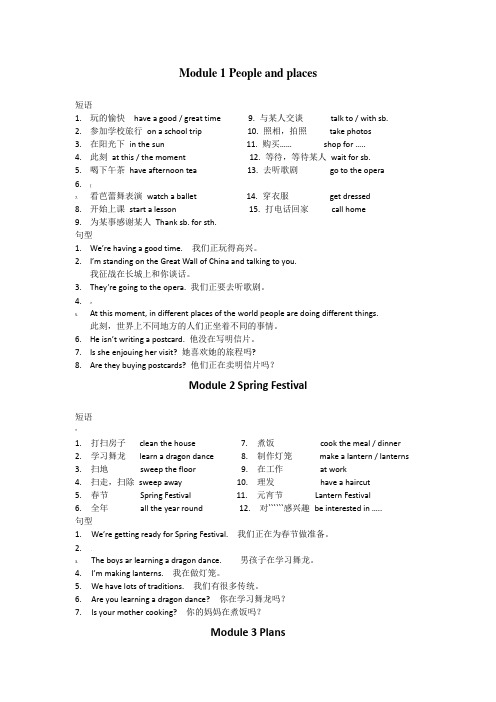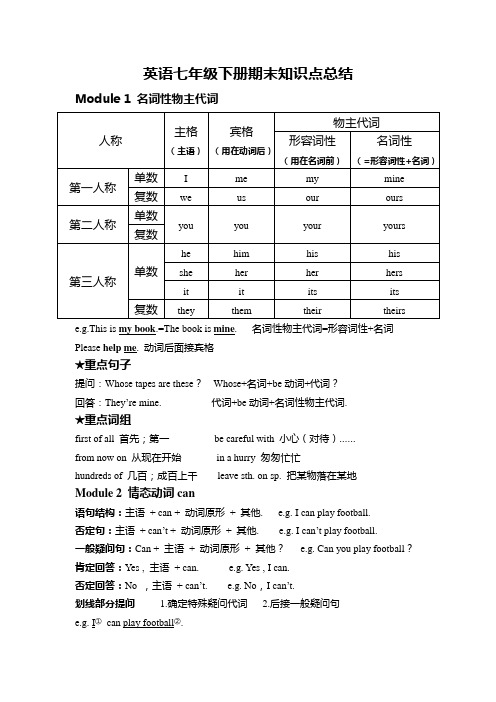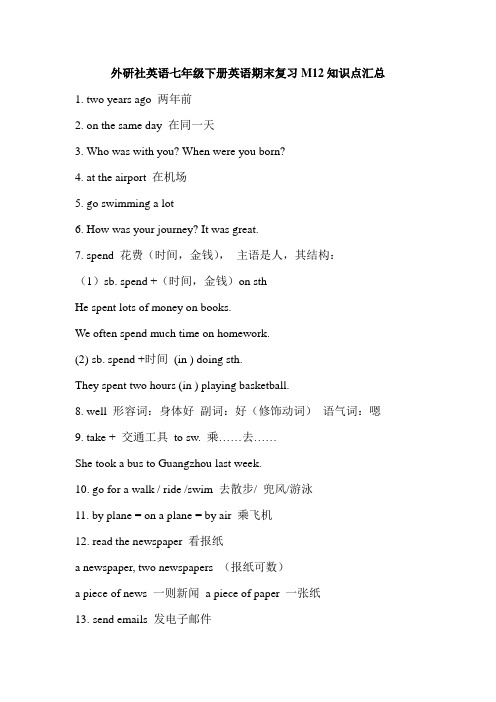最新外研版七年级英语下册期末复习归纳全册
- 格式:docx
- 大小:158.27 KB
- 文档页数:31

Module 1 People and places短语1.玩的愉快have a good / great time 9. 与某人交谈talk to / with sb.2.参加学校旅行on a school trip 10. 照相,拍照take photos3.在阳光下in the sun 11. 购买……shop for …..4.此刻at this / the moment 12. 等待,等待某人wait for sb.5.喝下午茶have afternoon tea 13. 去听歌剧go to the opera6.{7.看芭蕾舞表演watch a ballet 14. 穿衣服get dressed8.开始上课start a lesson 15. 打电话回家call home9.为某事感谢某人Thank sb. for sth.句型1.We’re having a good time. 我们正玩得高兴。
2.I’m standing on the Great Wall of China and talking to you.我征战在长城上和你谈话。
3.They’re going to the opera. 我们正要去听歌剧。
4.>5.At this moment, in different places of the world people are doing different things.此刻,世界上不同地方的人们正坐着不同的事情。
6.He isn’t writing a postcard. 他没在写明信片。
7.Is she enjouing her visit? 她喜欢她的旅程吗?8.Are they buying postcards? 他们正在卖明信片吗?Module 2 Spring Festival短语*1. 打扫房子clean the house 7. 煮饭cook the meal / dinner2. 学习舞龙learn a dragon dance 8. 制作灯笼make a lantern / lanterns3. 扫地sweep the floor 9. 在工作at work4. 扫走,扫除sweep away 10. 理发have a haircut5. 春节Spring Festival 11. 元宵节Lantern Festival6. 全年all the year round 12. 对``````感兴趣be interested in …..句型1.We’re getting ready for Spring Festival. 我们正在为春节做准备。

英语七年级下册期末知识点总结Module 1 名词性物主代词e.g.This is my book.=The book is mine. 名词性物主代词=形容词性+名词Please help me. 动词后面接宾格★重点句子提问:Whose tapes are these?Whose+名词+be动词+代词?回答:They’re mine. 代词+be动词+名词性物主代词.★重点词组first of all 首先;第一be careful with 小心(对待)……from now on 从现在开始in a hurry 匆匆忙忙hundreds of 几百;成百上千leave sth. on sp. 把某物落在某地Module 2 情态动词can语句结构:主语+ can + 动词原形+ 其他. e.g. I can play football.否定句:主语+ can’t + 动词原形+ 其他. e.g. I can’t play football.一般疑问句:Can + 主语+ 动词原形+ 其他? e.g. Can you play football?肯定回答:Yes , 主语+ can. e.g. Yes , I can.否定回答:No ,主语+ can’t. e.g. No,I can’t.划线部分提问 1.确定特殊疑问代词 2.后接一般疑问句e.g. I①can play football②.①Who can play football?②What can you do?★重点句子提问:What can you do?What + can + 主语+ do?回答:I can run really fast.. 主语+ can + 动词原形+ 其他.★重点词组would like 想要;希望worry about 担心……that’s all 仅此而已get on well with sb. 与某人相处融洽ready to do sth. 乐于做某事just like 正如;正像Module 3 一般将来时:be going to语句结构:主语+ be going to + 动词原形+ 其他.e.g. I am going to play football tomorrow.否定句:主语+ be not going to + 动词原形+ 其他.e.g. I am not going to play football tomorrow.一般疑问句:Be动词+ 主语+ going to + 动词原形+ 其他?e.g. Are you going to play football?肯定回答:Yes , 主语+ be动词. e.g. Yes , I am.否定回答:No ,主语+ be动词. e.g. No,I am not.划线部分提问1.确定特殊疑问代词2.后接一般疑问句e.g. I①am going to play football②tomorrow③.①Who is going to play football?②What are you going to do?③When are you going to play football?★重点句子提问:What are you going do on weekend?What + be +主语+ going to do +其他?回答:I’m going to check my email.. 主语+ be going to + 动词原形+ 其他. ★重点词组look forward to + doing 盼望做某事make friends 交朋友enjoy oneself 过得愉快take a walk 散步go sightseeing 观光Module 4 一般将来时:will语句结构:主语+ will + 动词原形+ 其他. e.g. I will have a present .否定句:主语+ won’t + 动词原形+ 其他. e.g. I won’t have a present .一般疑问句:Will + 主语+ 动词原形+ 其他?e.g. Will you have a present?肯定回答:Yes , 主语+ will. e.g. Yes , I will.否定回答:No ,主语+ won’t. e.g. No,I won’t.划线部分提问 1.确定特殊疑问代词 2.后接一般疑问句e.g. I①will have a present.①Who will have a present?②What will you do?③How many presents will you have?★重点词组in the future 将来be able to 能够做……not any more 不再……traffic jam 交通堵塞come true (希望、梦想等)实现,成真not only...but also... 不仅……而且……as well 和;又;也Module 5 特殊疑问句★重点句子What can I do for you?/ Can I help you?(店员询问)What about this one?/ How about this one?(店员提供筛选)What colour do you like?(询问颜色)What size do you take?(询问尺码)How much are they?(询问价格)May I try it on?(询问试穿)What else......?(询问其它物品)★重点词组try on 试穿wait a minute 别急;稍等一会儿one of ……之一go out 外出;离开one day 总有一天Module 6 方位表达方式常见的表达方位的介词短语on the left/right 在左边/在右边next to... 与…紧挨着go past... 经过…opposite... 在…的对面between...and... 在…和…之间on the corner(of...)在(…的)拐角处over there 在那里go along... 沿着…走go across... 穿过…turn left/right 向左转/向右转★重点句子Where is ...?/ How can I go to ...?/ Can you tell me the way to ...?(问路)★重点词组excuse me 劳驾,对不起Why not...?为什么不……呢?Module 7~10 一般过去时语句结构:主语+ 动词过去式+ 其他. e.g. I took a walk this morning .否定句:主语+ didn’t + 动词原形+ 其他. e.g. I didn’t take a walk this morning. 一般疑问句:Did +主语+动词原形+其他?e.g. Did you take a walk this morning?肯定回答:Yes , 主语+ did. e.g. Yes , I did.否定回答:No ,主语+ didn’t. e.g. No,I didn’t.划线部分提问1.确定特殊疑问代词2.后接一般疑问句e.g. I①took a walk②this morning③.①Who took a walk this morning?②What did you do this morning?③When did you take a walk?变化规则1.直接加ed e.g. walked , looked , finished2.不发音的字母e结尾,直接加d e.g. lived , noticed , decided3.以辅音字母+ y结尾,去y,变i,加ed e.g. hurried , married4.一个元音字母+ 一个辅音字母结尾,双写词尾加ed e.g. stopped , stepped 读音规则轻轻/t/ ,元浊/d/ ,/t/ /d/读/id/轻辅音读/t/,元音和浊辅音读/d/,以/t/ /d/两个音结尾的单词读/id/不规则动词常见不规则动词过去式、过去分词总结★重点词组Module 8once upon a time 从前go for a walk 散步all alone 独自一人的pick up 拿起;举起in pieces 破碎at first 起初;首先point at 指着……look around 看周围knock on the door 敲门Module 9find out 发现;查明;弄清at the age of 在…岁时around the world 世界各地Module 11 祈使句1.一般没有主语,省略主语you2.动词原形开头,无时态和数的变化3.表达请求加please,表达强烈语气,用“!”语句结构:动词原形+ 其它. e.g. Come to my office.否定句:Don’t + 动词原形+其它. e.g. Don’t come to my office.★重点词组shake hands 握手each other 互相;彼此arm in arm 臂挽臂地not at all 一点也不in fact 事实上Module 12 感叹句和选择疑问句感叹句语句结构:What + a / an + 名词! e.g. What a lovely day!.How + 形容词/ 副词! e.g. How lovely!选择疑问句e.g.Would you like coffee , tea or milk?1.用or连接,第一个选项读升调,第二个选项读降调2.or连接的前后内容可以不同,但必须并列。

最新外研版英语七年级下册知识点总结Module 1 Lost and found1、lost and found 失物招领the lost and found box 失物招领箱2、(1) welcome back to 欢迎回到某地... Welcome back to school.(2) welcome to +地点的名词欢迎来某地Welcome to China.(3) Welcome 跟地点副词时不带to welcome home 欢迎回家Welcome here .(4) You are welcome. 不用谢。
(5) give sb. a warm welcome 热烈欢迎某人They gave a warm welcome to us.3、first of all 首先= at first / firstly (常位于句首作状语,强调首要的事情或动作)First of all, you should finish your homework.4、there be 句型中谓语动词采用就近原则There is some food in the fridge.5、a lot of =lots of 许多既可以修饰可数名词复数,也可以修饰不可数名词。
There is a lot of water in the glass. I have lots of books in my room.6、(1) look at 看(强调“看”的动作)Come and look at my new coat.(2) look (不及物动词,单独使用,用以引起对方的注意) Look! That’s an English car.(3) see 看见(及物动词,强调“看”的结果) Can you see the bird in the tree?(4) watch 观看,仔细地看(比赛、电视、戏等)They are watching TV now.(5) read 看(书、报纸、杂志等) My mother is reading a book /a magazine /a newspaper.7、everyone/everybody 做主语,谓语动词用单数形式。

外研社英语七年级下册英语期末复习M12知识点汇总1. two years ago 两年前2. on the same day 在同一天3. Who was with you? When were you born?4. at the airport 在机场5. go swimming a lot6. How was your journey? It was great.7. spend 花费(时间,金钱),主语是人,其结构:(1)sb. spend +(时间,金钱)on sthHe spent lots of money on books.We often spend much time on homework.(2)sb. spend +时间(in ) doing sth.They spent two hours (in ) playing basketball.8. well 形容词:身体好副词:好(修饰动词)语气词:嗯9. take + 交通工具to sw. 乘……去……She took a bus to Guangzhou last week.10. go for a walk / ride /swim 去散步/ 兜风/游泳11. by plane = on a plane = by air 乘飞机12. read the newspaper 看报纸a newspaper, two newspapers (报纸可数)a piece of news 一则新闻a piece of paper 一张纸13.send emails 发电子邮件14. take lots of photos / pictures照很多相片15. fly to sw. 飞往某地fly home(不用to)16. Say hello to sb. 向某人问好say sorry/ goodbye to sb.17. How long did you +(延续性)动词?How long did you stay there?18. have a holiday 度假19. do a lot of shopping 购买了许多物品20. go on a boat = go boating 去划船。


最新外研版七年级英语下册期末复习归纳全册外研社七年级英语下册模块1 Lost and found 知识点归纳知识点一:模块1的短语1. lost and found失物招领2.welcome back to school欢迎回校3.first of all首先4.a lot of=lots of许多5.look at看6.from now on从现在开始7.be careful with sth小心对待某物8.talk to sb与某人交谈9.look for寻找10.get on the bus上公交车11.in a hurry匆忙地12.hundreds of成百的13.leave sth +地点把某物留在某地14.every day每天15.at the moment在此刻16.such as例如17.help sb. to do sth帮助某人做某事18.many other things许多其他东西知识点二:模块1的句型1.Welcome back to school, everyone.欢迎大家回到学校。
2.Please be careful with your things from now on. 从现在开始请仔细看管你的东西。
3.Whose gloves are they?它们是谁的手套?People often lose things when they’re traveling or when they’re in a hurry. They leave things on planes, on trains, on buses and in taxis.4.That’s why there are lost and found office at airports and stations.知识点三:重点词语解释1.Welcome back to school, everyone.欢迎大家回到学校。
初中英重点解析MODULE1一.短。
1.lostandfoundbox 失物招箱carefulwith 小⋯心⋯ 3.fromnowon 从在开始 4.(be)inahurry 匆忙5.hundredsof 成百上千for 找〔程〕 7.firstofall 首先找到〔果〕 9.trytodosth 努力做某事〔会成功〕from 从⋯中挑doingsth 做某事〔成功与否未知〕 12.atthemoment 此此刻13.suchas 例如〔用于列〕14.forexample 例如二.重点句型构Whose+名+isthis?是的⋯? helpsbdosth.帮助某人做某事3. Pleasebecarefulwith 小⋯心保管⋯ Welcometo+地点迎来到⋯ callsbat+号⋯某人打三.法。
物主代:表示所属关系的代〔⋯属于的〕单数复数人称形容词性物主代词名词性物主代词形容性物主代词名词性物主代词第一人称 my mine our ours第二人称your yours youryourshis his第三人称her hers theirTheirsitsits形容性物主代和名性物主代的关系:形容性物主代:必和名在一起。
Myfather,yourteacher...物主代名性物主代:相当于与之相的形容性物主代 +名。
Thisshirtismine.=Thisismyshirt.MODULE2一.短。
1.getonwellwithsb.与某人相融洽thepiano琴tabletennis打球about⋯?=howabout⋯怎?么...?1初中英重点解析about担⋯心⋯goodatdoingsth.擅做某事akite放筝’sall此而已readytodosth.于做某事二.重点句型构。
/Howaboutdoingsth?做⋯怎么?liketodosth..愿意做某事todosth.承做某事+球名玩⋯球the+器演奏⋯器(some)+ing形式做⋯sureofsth确信⋯⋯〔人的信念〕Wearesureofoursuccess.我确信我会成功。
初一下册英语期末复习资料外研版第一单元词组1. Play the guitar 弹吉他2. what to do sth 想做某事3. join the music club 参加俱乐部4. speak English 说英语5. match----with与------ 匹配6. play chess 下棋7. the swimming club 游泳俱乐部8. what club 什么俱乐部9.a sports club 一个体育俱乐部 10. be good at tellingstories 擅长讲故事11. the story telling club 讲故事俱乐部12. like to do/doing 喜欢做某事13. let’s join 让我们参加14. sounds good 听起来好15. students wanted for School Show to /with跟某人谈话17. after school 学校表演招聘学生16. talk 放学后 18. do kung fu表演功夫19. show sb sth=show sth to sbdoing做事情很有趣把某物展示某人23. have fun20. play games with people 和人们做游戏24. on the weekend 在周末21.be in the school music club 学校音乐俱乐部25. call sb at给某人打22. need sb to do sth 需要某人做某事26. help+sb +v 协助某人27. help sb with sth students英的学生stories某人故事助某人做某事28. English-speaking 29. play the piano琴30. tell sth31. it +adj +for sb to sth 32. be good with 和某人相好33. help for old people 老人的助34. make friends with 和某人交朋友35. in July / on the morning of 36. be free / be busy37. the Students ’ Spor ts center 学生的运中 38. teach sb to do sth教某人做某事39. need help to teach music需要助来做某事40. the teacher do what he can to help students 老做他能做的事来助学生用法集萃play + 棋 / 球下⋯⋯棋,打⋯⋯球 play the + 西洋器/拉⋯⋯器be good at doing sth.= do well in doing sth. 擅做某事be good with sb. 善于与某人相 need sb. To do sth. 需要某人做某事can + 原形能/ 会做某事 a little + 不可数名一点儿⋯⋯join the ⋯club 参加⋯俱部 like to do sth. =love to do sth.喜 / 喜做某事典句必背Can you draw? Yes, I can. / No, I can’t.What club do you want to join? I want to join the chess club.You can join the English club. Sounds good.I can speak English and I can also play soccer. Please callMrs. Miller at 555-3721.第二单元词组1. go to school 去上学2. get up 起床3. get dressed 穿衣服4. brush teeth 刷牙5. eat breakfast 吃早饭6. take a shower 洗澡7. what time 什么时间8. at six thirty 在六点半9. an interesting job 一个有趣的工作10. at the radio station在播送电视台11.always /usually/ often/ sometimes/ never 12. yourradio show 你的播送节目13. from ----to 从哪里到哪里 14. at night 在夜晚15. a funny time 一个有趣的时间 16. take exercise 锻炼17. be late for 迟到 18. at about ten twenty 在大约十点二十19. on weekends 在周末 20. on school days 在上学日21. half past six 六点半 22. a quarter past three 三点过一刻23. a quarter to seven七点差一刻24. do homework 做家庭作业25. take a walk 散步 26. have much time 有很多时间27. half an hour 半个小时 28. get home 到达家29. either-----or 或者 ---- 或者 30. eat a good breakfast 吃一顿快餐31. lots of /a lot of 很多32. be good for ------ 有益33. taste good have a healthy life 起来好 34. do her homework有一个健康的生活方式做她的家庭作35.用法集萃at + 早 / 具体点午 / 晚在几点〔几分〕eat breakfast/ lunch/dinner 吃thirty\half past + 基数⋯⋯点半fifteen\a quarter to + 基数差一刻到⋯⋯点from ⋯to ⋯从⋯⋯到⋯⋯need to do sth 需要做某事典句必背1.What time do you usually get up? I usually get up at sixthirty.2.That ’s a funny time for breakfast.3. When do studentsuasually eat dinner?They usually eat dinner at a quarter to seven in the evening.4.In the evening, I either watch TV or play computer games.5.At twelve,she eats lots of fruit and vegetables for lunch..6. She knows it ’s not good for her, but it tastes good.7. Here are your clothes. 佳作析主:日常作息My School DayI am a student. I usually get up at seven, and I eatbreakfast at seven thirty. Then I go to school at eight.School starts at eight thirty. I eat lunch at taelve. I gohome at 17 :00. I often eat dinner at 19:00 and then playthe piano. I do my homework at 20:00. At 22:00, I go to bed.第三单元词组1. get to school 到达学校2. take the train 乘火车3. take the subway 乘地铁4. ride a bike 骑自行车5.how do you get to school 怎么到达学校6. one hundred and five1057. how far is it 多远 8. how long does it take sb to do sth 花费某人多长时间做某事 9. ten minutes-----how long 10. tenminutes ’ walk -------how far11. ride the bike to school 骑自行车到学校12. every day 每天13. walk to , drive to ,fly to 14. I ’m not sure 我不敢确信15. about= around 大约 16. 10 kilometers away from 十公里远17. good exercise 好的锻炼 18. walk to school 步行去学19. get home 到达家 20. drive his car to work 开车去上班21. in his father ’s car 坐父亲的车 25. crossing the river is穿过河是22. need about 10 minutes to get to school 需要十分钟的时间到达学校23. I want to know where Bob lives 我想知道鲍勃住到哪24. what do you think of =how do you like 你觉得怎么样26. it is easy to get to school=it ’s+ adj. +for sb. to dosth. 到达学校很容易27. there is 就近原 28. between----and 在两者之29. no= not any =not a 30. the river run quickly 河水流的快作上 fast 速度上 soon 上 32. on a ropeway 在索道上33. go on a ropeway to cross the river 坐索道穿河 37. love to do 喜做某事34. an 11-year-old boy 一个 11 大的男孩35. ten minutes ’ walk / a ten -minute walk 10 分的路 39. leave for . 离开到某地36. be afraid to do, be afraid of sth / doing 害怕做某事 41. come true38.be like a father to me像父一做某事43. why ------because40. leave sth at/ on /in +地点把某物留在某地42. why not +v原形44. thanks for +n /doing sth什么而感45. how to do it怎么来做它46.at about 8 :00 在大 8 点用法集萃take ⋯ to⋯= go to⋯ by⋯ 乘⋯去⋯How do / does 〔sb〕get to ⋯? ⋯是怎到⋯的?How far is it from ⋯to ⋯? 从⋯到⋯有多?It takes sb. some time to do sth. 做某事花某人多。
外研版七年级下学期英语期末总复习资料大全Module 1:1.短语归纳:1.失物招领箱:Lost and found box2.小心:Be careful with…3.从现在开始:From now on4.匆忙:XXX5.成百上千:Hundreds of6.寻找(过程):Look for7.首先:First of all8.找到(结果):Find9.努力做某事(会成功):Try to do sth10.从…中挑选:Choose from11.试图做某事(成功与否未知):XXX12.此时此刻:XXX13.例如(用于列举):Such as14.例如:For example2.重点句型结构:1.这是谁的 (XXX)2.帮助某人做某事:Help sb do sth.3.请小心保管…:XXX…4.欢迎来到…:e to +地点5.拨…给某人打Call sb at +电话号码3.语法专项:物主代词:表示所属关系的代词(…属于谁的)单数:人称:第一人称、第二人称、第三人称形容词性物主代词:my、your、his、her、its名词性物主代词:XXX、yours、his、hers、its复数:形容性物主代词:our、your、their名词性物主代词:ours、yours、XXX形容词性物主代词和名词性物主代词的关系:形容词性物主代词必须和名词在一起,如:My XXX。
your XXX…名词性物主代词相当于与之相对应的形容词性物主代词+名词。
如:This shirt is mine。
=This is my shirt.Module 2:1.短语归纳:1.与某人相处融洽:Get on well with sb.2.弹钢琴:Play the piano3.打乒乓球:Play table XXX4.怎么样。
What about…。
=How about…?5.担心…:XXX…6.擅长做某事:Be good at doing sth.7.放风筝:Fly a kite8.仅此而已:That’s all9.乐于做某事:Be ready to do sth.2.重点句型结构:无注:文章本身没有明显的格式错误和有问题的段落,只是需要进行小幅度的改写。
最新外研版七年级英语下册期末复习归纳全册外研社七年级英语下册模块1 Lost and found 知识点归纳知识点一:模块1的短语1. lost and found失物招领2.welcome back to school欢迎回校3.first of all首先4.a lot of=lots of许多5.look at看6.from now on从现在开始7.be careful with sth小心对待某物8.talk to sb与某人交谈9.look for寻找10.get on the bus上公交车11.in a hurry匆忙地12.hundreds of成百的13.leave sth +地点把某物留在某地14.every day每天15.at the moment在此刻16.such as例如17.help sb. to do sth帮助某人做某事18.many other things许多其他东西知识点二:模块1的句型1.Welcome back to school, everyone.欢迎大家回到学校。
2.Please be careful with your things from now on. 从现在开始请仔细看管你的东西。
3.Whose gloves are they?它们是谁的手套?People often lose things when they’re traveling or when they’re in a hurry. They leave things on planes, on trains, on buses and in taxis.4.That’s why there are lost and found office at airports and stations.知识点三:重点词语解释1.Welcome back to school, everyone.欢迎大家回到学校。
v. 欢迎welcome to school 欢迎来到学校welcome home 欢迎回家Welcome back!欢迎回来adj. 受欢迎的。
例如:He is a kind boy, so he is welcome. 他是个和蔼的男孩,所以他很受欢迎。
2.Please be careful with your things from now on. 从现在开始请仔细看管你的东西。
1)be careful with 小心对待例如:Be careful with your baby when you are traveling. 当你旅行的时候,小心照顾好你的小孩。
2) from now on 从现在开始作为时间状语,一般用在现在时和将来时态中。
例如:He will work hard from now on. 从现在开始,他将努力工作。
from then on 从那时开始作为时间状语一般用在过去时态中例如:He lived alone from then on. 从那时起,他就独自居住。
3. People often lose things when they’re traveling or when they’re in a hurry. 当人们在旅行或是很匆忙的时候,他们经常会丢东西。
1)when 当…时候,用于引导时间状语从句,表示主从句的动作同时发生。
例如:We have lessons when it is September. 九月份的时候我们开学。
2)in a hurry 匆忙地,做状语。
常用于句尾。
“hurry”V. 匆忙。
例如:Hurry up 快点。
He hurried to come into the room. = He came into the room in a hurry.他快速进入房间。
4.They leave things on planes, on trains, on buses and in taxis. 他们把东西落在飞机上,火车上,公交车上和出租车上。
1)leave 当“离开”讲,leave A for B 离开A 地动身前往B 地。
2)leave 当“落下”讲。
例如:I left my homework at home. 我把作业落在家了。
3)on planes “乘飞机”还有其他的说法。
“by plane=take a plane=on a plane”5.That’s why there are lost and found office at airports and stations. 那就是为何在飞机场和车站设有失物招领处的原因。
1)that’s why…是固定句型,后面引导表语从句例如:that’s why he is late for class. 那就是他为何迟到的原因。
2)at airports 在飞机场。
airport 是小地点,常用介词“at”知识点四:语法点:(一)特殊疑问词引导的特殊疑问句:1.whose 谁的例如:this is Lily’s bag. --------whose bag is this?This bag is Lily’s ------------whose is this bag?2. who 谁(对主格和宾格提问)例如:who runs fastest? 谁跑得最快?Who do you want to meet ? 你想遇到谁?3.when and where 对时间和地点提问,“何时何地”例如:when and where shall we meet? 我们何时何地见面?4.how long 时间多久例如:how long will you stay in Beijing? 你将在北京待多久?5.how far 距离多远例如:how far is it from here? 距离这多远?注意:it is a 5 minutes’s walk from here. -------how far is it from here?6. how soon 多久之后用于将来时,常有in+ 时间段作为时间状语例如:I will be back in 3 days -----------how soon will you be back?7. how often 表示动作的频率例如:I take the medicine 3 times a day. ---------how often do you take the medicine.(二)名词性物主代词物主代词分为形容词性物主代词和名词性物主代词两种。
形容词性物主代词放在名词前作定语,相当于形容词;名词性物主代词相当于“形容词性物主代词+名词”,相当于名词,可以作主语、表语或宾语。
物主代词形容词性数人称单数复数第一人称my我的our我们的第二人称your你的your你们的第三人称his他的,her她的,its它的their他们的物主代词名词性数人称单数复数第一人称mine我的ours我们的第二人称yours你的yours你们的第三人称his他的,hers她的,its它的theirs他们的物主代词的用法:(1)形容词性物主代词放在名词前作定语。
例如:His pencil box is on the desk.This is our school.(2)名词性物主代词作名词用本身就相当于“形容词性物主代词+名词”,因此,后面不可再加名词。
作主语:Richard’s school bag is blue and mine is black.里查德的书包是蓝色的,我的书包是黑色的。
(mine=my school bag)作表语:It’s his.这是他的(东西)。
作宾语:He borrows your dictionary and you may borrow mine.他借你的字典,你可以借我的。
(作及物动词的宾语)“of+名词性物主代词”可以放在名词后作定语,表示强调:He is a friend of mine.他是我的一个朋友。
·注意:试比较下面两句句子:This is a photo of mine.这是我的一张照片。
(照片是我拥有的,但不一定照的是我本人)This is a photo of me.这是一张我本人的照片。
(照片上是我本人)外研社七年级英语下册模块2 What can you do知识点归纳知识点一:模块2的短语1.would like to do sth . 想要做某事2.join a club参加俱乐部3.play the piano弹钢琴4.worry about 担心,担忧5.teach sb. sth. 教某人某事6.get on well with ... 与……相处融洽7.be ready to do sth . 乐于做某事8.promise sb. sth.承诺/保证某人某事9.be good at擅长做某事10.do cleaning 打扫卫生知识点二:重点词语解释Unit one1.would like to do sth . 想要做某事eg:I would like to go there with you.我想跟你一起去那里。
would like常缩写为’d like。
would没有人称和数的变化。
其用法如下:eg:Mike would like some bananas. 迈克想要一些香蕉。
We’d like to watch TV. 我们想看电视。
I’d like Lingling to go with me. 我想让玲玲跟我去。
2.join v.参加,加入到……之中eg:Would you like to join the Football Club, Kate? 凯特,你想加入足球俱乐部吗?join指加入某党派、某组织或某社会团体或某一人群中,成为其中的一员。
Will you join us for dinner?你和我们一起吃饭好吗?take part in指参加群众性活动、劳动、游行等,有时可与join in互换。
Will you take part in the English evening?你会参加英语晚会吗?3.play the piano弹钢琴当play后面跟某种乐器名词时,表示乐器的名词前要加the;当play后面跟球类或棋类名词时,其前不加任何冠词。
eg:She is good at playing the piano.她擅长弹钢琴。
Jack’s hobby is to play chess. 杰克的爱好是下国际象棋。